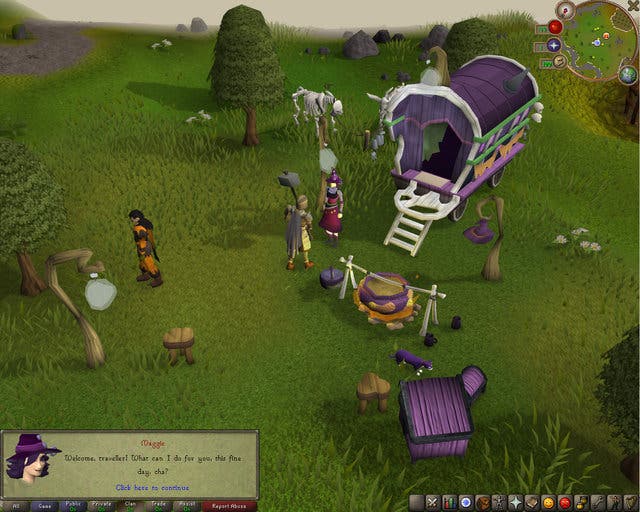Gold Trading Exposed: Introduction
The elephant in the room.
"ALL BOW TO MARK JACOBS!" screamed one exultant fan. "God I love you guys. I really can't say that enough," gushed another. "Big cheer. They're roaches, and as hard to get rid of, and will probably survive when everything else on the planet is extinct," said yet another.
Meanwhile, speaking to Eurogamer last year, RuneScape content boss Imre Jele said that those buying MMO currency were effectively funding digital organised crime, not to mention cheating and ruining the experience for everyone else.
"The biggest concern about illegal real-world trading is - sorry for this example as I know it's not politically correct - it's a bit like prostitution," he said. "It's not necessarily the prostitution which is a problem, although you might have moral problems with it. The real problem is the organised crime that's built around prostitution; the human trafficking, the drugs, etc.
"And that's the same with illegal real-world trading. The problem comes in when they start doing other illegal activities [such as] the use of stolen credit cards."
And yet the RMT market keeps growing. Why?
Stereotypes
We all know the stereotype bandied around. The gold seller we think we know is a Chinese or Korean gold farmer, visualised sitting in endless rows in some developing-world sweatshop, working 12-hour shifts for a miserly few Euros whilst their evil bosses cream the profits and the innocent gamers' lives are made a "misery" by spamming, botting and - as Jele claims - stealing credit cards and hacking accounts before selling back items from those same accounts to their fellow players.

But if you look into MMO history, it seems gold selling and related services have been with us since the genre first surfaced in the late 1980s within graphics-based multi-user dungeons, or MUDs. It then progressed through the likes of Ultima Online in the late 1990s to the more sophisticated forms it's seen in today. "Whenever a new online game was launched, items would be available for sale on eBay within a few weeks," says Richard Heeks of Manchester University, who has studied the phenomenon.
According to Vili Lehdonvirta of the Helsinki Institute for Information Technology, the global market for virtual items, characters and currencies already exceeded USD 2.1 billion by 2007. Meanwhile, Heeks claims that the gold selling industry now employs hundreds of thousands of people across the developing world.
"From a development perspective, it is providing income, jobs and skills. It is thus offering one answer to the conundrum of how to create new livelihoods from the ICT infrastructure spreading throughout developing countries," he says, raising a separate and very interesting angle to the usual arguments.
"Selling virtual goods for real money is an increasingly common revenue model not only for online games and virtual worlds, but for social networking sites and other mainstream online services as well," Lehdonvirta points out in his recent study of the sector, mentioning that Facebook and many other social media sites already had a healthy trade in virtual items.
History
"Extreme Gamer", an anonymous young man based in the USA who runs the RMT review site WoW Gold Facts, summarises from a more personal perspective how the gold selling market has evolved - and why so many of us (apparently) want to use these services, despite the frequent public protestations against them.

"As you would expect, the market for virtual items has evolved tremendously. In most online role-playing games, items - like swords, armour, game currency, potions and tradeskill resources - can be traded from player to player. Items are desirable in the game world. It wasn't long after the launch of the first MMO that gamers were offering each other 'real world value' for items, as an inducement to trade. Perhaps they exchanged real money outside of the game, or perhaps the items were paid for with services, like power-levelling."
He adds: "The buying and selling of virtual items really took hold with the launch of eBay and online payment solutions like PayPal, which made it possible for gamers to build a marketplace and expand the practice beyond family and friends. What began as a cottage industry, in the 1995 to 2000 time-frame, began to mature around 2002 with the introduction of professional sites like MySuperSales.com, which brought security (the fraud rate on eBay was reported to exceed 10 per cent of all transactions), inventory volume, and 24-hour customer service into the mix. By 2006, it had evolved into a billion-dollar business."







